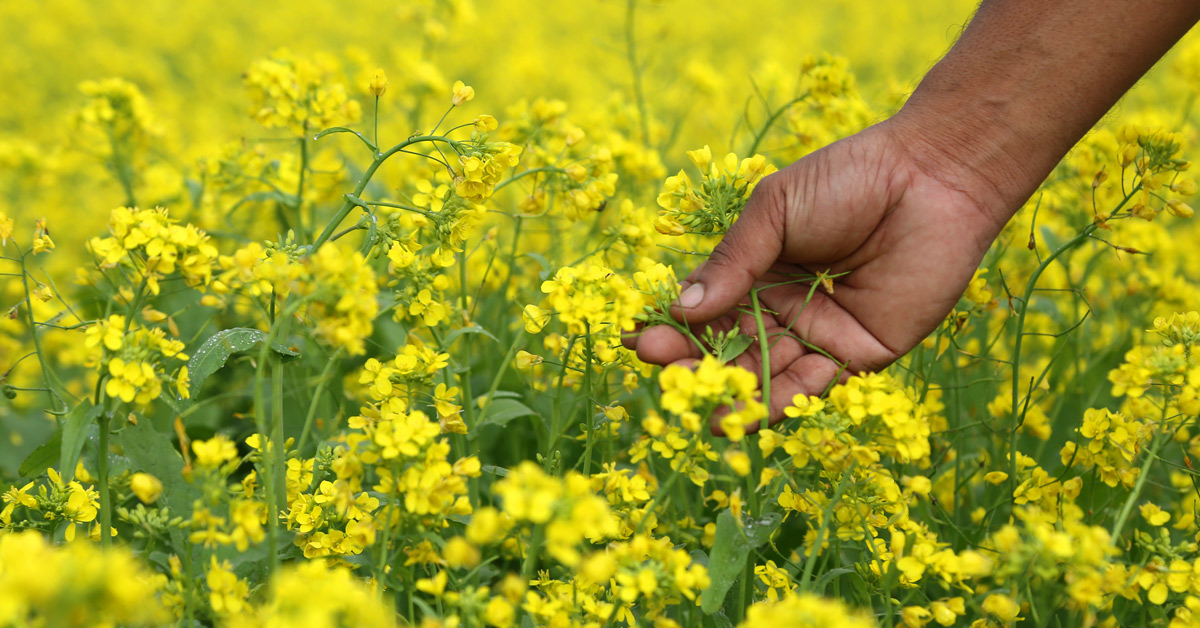
Doctors warn of dangers of genetic modification and toxic effects of glufosinate herbicide
In India, over 100 medical doctors have sent a letter to prime minister Narendra Modi calling upon him to stop the environmental release of genetically modified mustard DMH-11 and its two parental lines, which are tolerant to the toxic herbicide glufosinate ammonium.
The doctors write that they are not opposed to application of gene technologies in medicine, "as it is done after thorough testing, consumed by individual choice, closely monitored by expert doctors, with the GMO-mediated medicines/supplements prepared in contained conditions without any release of GMOs into the environment and can be halted/recalled".
In contrast, they write, "GM in farming and food is both uncontrollable and irreversible and affects both present and future generations."
They continue: "In terms of health impacts, an adequate scientific body of evidence exists about various adverse health impacts on immunity, reproductive health, growth and development, vital organs and even carcinogenicity - from a combination of toxic genes used in genetic engineering, the GE [genetic engineering] process itself and the deadly chemicals used on GM crops. It must thus be a last resort when no other options exist and subject to proper long term biosafety tests for transparent peer review. It has been seen time and time again, however, that crop developers and regulators circumvent the need for comprehensive testing, because they know that the inherent lack of safety in this technology will get captured in the results of such testing."
The doctors state that in the case of GM mustard, a "patently untenable claim" is being made, including in submissions to the Supreme Court, that the herbicide glufosinate will only be used for seed production and that farmers will be prevented by legislation from spraying it for weed control.
However, they warn, planting of GM herbicide-tolerant cotton and illegal spraying of the dangerous herbicide glyphosate on the cotton has been taking place for years, without governments being able to stop it. They say, "Once environmentally released, GM mustard will spread and so will the use of glufosinate. Our entire population consumes mustard as seeds, leaves and oil. As medical professionals, we feel it is our duty to warn about the serious adverse impacts of herbicide-tolerant GM crops which, in effect, this GM mustard DMH-11 is."
The doctors point to the findings of three high level committees – the Technical Expert Committee of the Supreme Court (2013) and the unanimous reports of two multi-party (including BJP) Parliamentary Standing Committees (2014 and 2017), which examined GM crops in detail: "All the Committees recommended a complete ban on herbicide-tolerant crops in Indian conditions, giving cogent reasons. We endorse these recommendations and request you to halt the open air planting of GM mustard DMH-11. We urge the uprooting of any seeds that have been planted before they reach the flowering stage and DMH-11 spreads irreversibly."
The doctors emphasise that "opposition to GM is scientifically sound", as shown by over 760 eminent scientists who in 2001 highlighted the unpredictable and unintended dangers from the genetic modification process, including the spread of antibiotic resistance marker genes that could render infectious diseases untreatable and harmful mutations which may lead to cancer (the latter presumably applies to human and animal genetic engineering).
The signatories add that over the past 25 years, the poor performance and the irreversible risks of GM crops have been such that only five countries still account for 91% of global GM crop area.
The doctors are also concerned about the genetic modification of the mustard with Bar, Barnase, and Barstar genes, "originating from two strains of bacteria which have never been part of human diet, and the insertion of a novel cassette which includes promoters, enhancers", as these processes "can create novel proteins with unpredictable impacts".
Further, the doctors add, the herbicide tolerance genes embedded in the GM mustard will facilitate the spraying of the herbicide glufosinate ammonium, which is damaging for health. In a reference to India's GMO regulator GEAC, the doctors write, "We are shocked that GEAC has till date not put biosafety test data up for peer review despite an order by the Central Information Commissioner in 2016 calling for it and despite Supreme Court orders on the same. We also understand that the necessary long term, intergenerational and other biosafety tests have not been done, and the limited tests done on GM mustard (lesser in number than were taken up for Bt brinjal even though mustard is grown on 11-fold more area). All this makes DMH-11 clearance as ‘safe’ for environment release by the Genetic Engineering Appraisal Committee (GEAC) highly questionable and objectionable. It is also disturbing that an independent testing laboratory for verifying safety claims by GM developers has not yet been set up despite repeated recommendations for it."
The doctors demand:
* a complete ban on all herbicide-tolerant crops, including GM mustard, as they increase the use of herbicides dangerous to health
* a halt to all GM crop releases until an independent test laboratory is established as recommended by the late Dr P. M. Bhargava, Supreme Court nominee to GEAC and eminent Founder Director of the Centre for Cellular & Molecular Biology
* uprooting of all DMH-11 mustard that has been planted, to prevent the accidental or deliberate spread of a GM herbicide-tolerant mustard
* halting the illegal spread of GM crops and illegal use of herbicides, and
* implementation of the recommendations of the Technical Expert Committee of the Supreme Court, and the reports of the Parliamentary Standing Committees.










